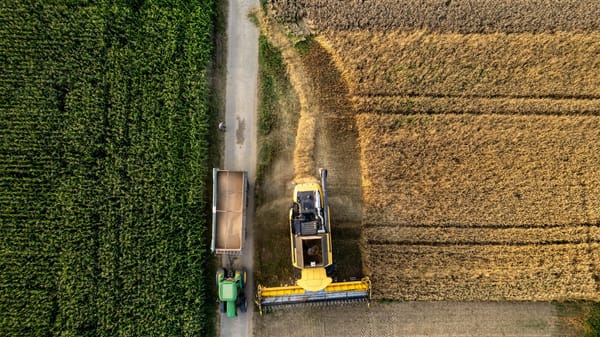Become a Scientist
When the pressure for success starts driving you mad, start thinking like a scientist. This week’s issue is about heroes, tyranny, and mosquitoes.

A lot has been written about how failure is a necessary vehicle for success. Still, we seem to be more stressed than ever from work and peer pressure to “succeed” one way or another in all the different aspects of our lives. We either win or learn—easier said than done. Despite the infinitely repeated proclamation of this mantra, phenomena such as depression, anxiety, and burnout do not abate. Let’s face it: ultimately, society demands success from us. Without success we can’t survive in the material world. Without success through reproduction and adaption species go extinct. Therefore, in just about any population of any species, an individual that does not perform a task useful to the collective, while meeting a certain standard of quality, is either killed, eaten, cast out, or otherwise replaced.
Welcome to the harsh reality. The attitude of accepting failure is often the bold assertion of those who enjoy a strong enough safety net—or those who have gone through severe pain and hardship. But in the end, when push comes to shove, most of us are scared to death of failing too many times in a row.
Becoming a Scientist
Some people perform better under pressure, while others don’t. For those whose performance drops with increasing pressure and stress, and who find success receding into the distance, even though they keep telling themselves that success is inevitable if they just fail often enough, here’s a suggestion:
Become a scientist.
Although failure is an essential part of any profession, in no field of human excellence does this truth become clearer than in science. If you treat new things you do as experiments, you drastically reduce the devastating sensation of failure. In science, failure—in the sense of an outcome deviating from the anticipated result—is literally part of the discipline. Experiments often don’t work as expected, hypotheses are frequently disproven, and setbacks are common.
Science completely free from expectation and anticipation is certainly utopian, but scientists tend to cultivate an attitude of separating themselves from the subject at hand. In other words, they are better than members of other professions at treating failure not as personal defeat but as valuable data points that guide them toward refinement and improvement—a mindset that fosters resilience and a pragmatic approach to failure.
A large portion of individual scientists have never “succeeded” at anything—in the sense of proving a certain theory or achieving a desired outcome. But all of them lay important foundations for future work and enable the final “success” of other scientists. How do they fuel their work? For the true scientist, the act of trying and exploring in and of itself is the purpose of their work—their “success.”
Additionally, scientists typically work in iterative cycles, testing and refining ideas over time. The scientific method itself is designed to embrace failure, with hypotheses constantly tested, falsified, and adjusted. For them, each failure is a step toward uncovering the truth or discovering a solution.
Many scientific pursuits also involve long periods of uncertainty, with results often taking years to emerge. Thus, scientists tend to be better at handling uncertainty and are more patient with the time it takes to achieve success.
Lastly, the scientific community often encourages the discussion of failed experiments through papers, conferences, and peer reviews. This open exchange of information helps reduce the stigma of failure and normalizes the experience.
The Nature of Failure
Whenever we fail at something, it’s because we haven’t reached the required skill level yet, either because we haven’t done it before or because we haven’t done it long enough. Even the effects of external factors, complexity, and randomness become more manageable with greater skill and experience.
A complex skill, like building a spacecraft, developing a vaccine against HIV, or composing a piano piece, requires many repetitions to master. Other less complex skills, like walking home alone from school, may require just one repetition to reach success. In both cases, if we never perform the task, success is unattainable. Every repetition that precedes the one that constitutes success is, by definition, a failure. So the only reason we fail is because we haven’t yet completed a successful repetition. In many cases, this means we just haven’t done it that one successful time.
Do you fear you’ll fail at baking bread? At designing that presentation? At going on a trip alone? At delivering that project on time? At becoming an actor or an astronaut? Try focusing your entire attention on the process of exploration leading to that single repetition, rather than fixating on achieving the singular predefined goal state.
Whether we don’t know how it’s done, don’t see it being done by others, or don’t believe it’s possible—exploring the “how” lies at the core of a scientist’s work.
- If you don’t know how to do it, find a guide, recipe, course, or teacher to follow. Push through and do that one repetition. Bake the bread, design the presentation, organize the trip, deliver the project, or pursue becoming an actor. The result will most likely not be perfect, but the success is in the doing. The first repetition gives you the highest return in terms of the steep initial learning curve. That’s why people commonly revert to the mantra, “just get started.”
- If you don’t see it being done, and thus, don’t see it as possible, surround yourself with people and consume content from those who have already done it. Actively cultivate a mindset of knowing that if others have done it or something similar, you can too.
- If you don’t believe it’s possible, perhaps this is a sign to let it go and pursue something else. Without belief in what we do, every step, every Euro, and every hour invested will feel like a waste of energy, feeding an ever-increasing void within.
Maybe you’re a scientist reading this and thinking, “Well, that’s definitely not me.” Individual scientists vary widely in their personal resilience and coping mechanisms. While some embrace failure and learn from it, others struggle emotionally, especially if they attach personal value to their successes and failures. Not to mention the pressure of funding, publishing, and recognition, which often weighs heavily. Certainly, many scientists call themselves scientists but struggle to embody the scientific mindset, just as many students don’t embody the academic mindset. If the goal is the grade, the result, or the salary rather than the exploratory path, the pressure of success will never resolve.
In the end, what I’m suggesting is just another perspective or shift of mind. Maybe you’ll find this one helpful, too. I’ve found that with most obstacles and challenges in life, all we need is the one perspective that suits our unique personality.
Become a scientist.
“Alright, let’s find out how to go about this.”
Have a phenomenal week!
⏤Ferdinand
✨ Sunday’s Sparks
📝 Article: On The Tolkienic Hero
This piece delves into the development of heroic figures through literature and history, focusing on J.R.R. Tolkien’s creations and highlighting the contrasts between ancient and modern conceptions of power, right and wrong, good and evil. In short, it explores the question: ‘What makes a hero?’
The hero wants not fame, nor fortune; he is not motivated by power, nor by revenge. He performs his heroics out of necessity, out of duty, or out of the simple fact that he is the only one on the scene. The hero would rather not be out slaying dragons. He earnestly wishes for a normal life. He yearns for a peaceful and settled world where he is not the chosen one. But it is precisely because our hero lacks ambition that he can be trusted. In a world where men ache for power, we cheer for the protagonist who emphatically rejects it. From beginning to end, our hero's defining trait is a desire not to be a hero. Some are born great, others achieve greatness—but we love best those blessed few who have had greatness thrust upon them.
The distinction between greatness and power as goods to be strived for versus greatness and power as burdens to be carried is the distinction that sets apart almost of all of the novel's protagonists from their foils. It is the defining difference between Frodo and Smeagol, Faramir and Boromir, Aragorn and Denethor, and Gandalf and Saruman.
Though this conception of power, corruption, and responsibility defines the mythic templates of our day, this is not the myth on which past ages were made. I referenced earlier Shakespeare's line about those who have "greatness thrust upon them." Read it context and you will discover that it written to lampoon, not to inspire. [1] With those lines Shakespeare satirizes the vain and foolish upstarts who assume the privileges of high station without having done anything to deserve them. Shakespeare has nothing against those privileges; his plays assume that any young man worth his weight should be ambitious in their pursuit. But the key is that they must be pursued, and his tragedies and comedies both are filled with good men who leave home to chase fortune and glory.
A good man would be a good man in power; a bad man would be a bad man in power. But without wealth, rank, or influence, it was difficult to distinguish the first man from the second.
The ironist inspires no one. He draws absurdity out of our crooked timbers, but he can find no purpose there. He can move to mirth, but not to awe. He provokes disgust, but not commitment. He pokes fun at those who imbue life with meaning, but has no meaning of his own to impart. Some ironists are wry. Some are coy. Some are absurd. Others are simply vicious. But none are wise. The ironist knows the truth but he does not know the Dao. Yet it is the Dao the masses yearn for.
📚 Book: On Tyranny, Timothy Snyder
Historical and political guide providing twenty concise lessons from the rise of totalitarianism in the 20th century. Snyder draws on the history of Nazi and Soviet regimes to offer practical advice for resisting modern threats to democracy. This work serves as a powerful reminder of how easily tyranny can take root and emphasizes the importance of protecting civil liberties and democratic institutions in the face of growing authoritarianism.
Extremism certainly sounds bad, and governments often try to make it sound worse by using the word terrorism in the same sentence. But the word has little meaning. There is no doctrine called extremism. When tyrants speak of extremists, they just mean people who are not in the mainstream—as the tyrants themselves are defining that mainstream at that particular moment. Dissidents of the twentieth century, whether they were resisting fascism or communism, were called extremists. Modern authoritarian regimes, such as Russia, use laws on extremism to punish those who criticize their policies. In this way the notion of extremism comes to mean virtually everything except what is, in fact, extreme: tyranny.
🧳 Travel: Lemon Eucalyptus Essential Oil
One of the most common challenges for the frequent traveler, besides ensuring clean water and properly cooked food, is avoiding mosquito-borne diseases—such as malaria, dengue, Zika virus, yellow fever, and chikungunya. While there are various products available to reduce the risk of exposure, the options for natural methods are quite limited. The best preventive measures include:
- Wear long clothing to minimize exposed skin.
- Avoid swampy or moist regions where mosquitoes thrive.
- Stay indoors during peak mosquito activity (often around sunset, though this varies by mosquito type).
- Sleep under a mosquito net.
While these methods are preferable since they avoid putting any substances on or into your body, sometimes repellents are necessary. When that’s the case, Lemon Eucalyptus Essential Oil is an excellent natural alternative.
Make sure to get the right one, derived from the Corymbia citriodora tree (formerly Eucalyptus citriodora). It contains the active ingredient p-Menthane-3,8-diol (PMD) which is the key component responsible for its mosquito-repelling properties. Dilute it with a carrier oil like coconut or jojoba at a 1:10 ratio—about 10-12 drops of essential oil for every 30 ml (1 ounce) of carrier oil. Some lotions or carrier oil can be found virtually anywhere in the world, so a small 30-50 ml bottle of essential oil will last you forever. Apply the mixture to exposed skin, reapply as needed every 4-6 hours. Tweak the formula to suit your needs based on its effectiveness and how your skin responds.
💡 Sunday’s Wisdom
The truth will set you free, but it doesn’t make truth hurt any less, nor does it make truth any prettier, and it certainly doesn’t absolve you of the responsibilities that truth requires.
From The Rational Male by ROLLO TOMASSI.
Captured and resurfaced using the phenomenal Kindle reader.
Did you enjoy this issue? If you draw value from Sunday Sparks please consider contributing to this publication’s financial freedom.
Flows straight into content, not coffee.




